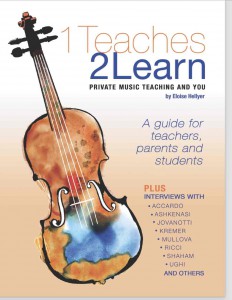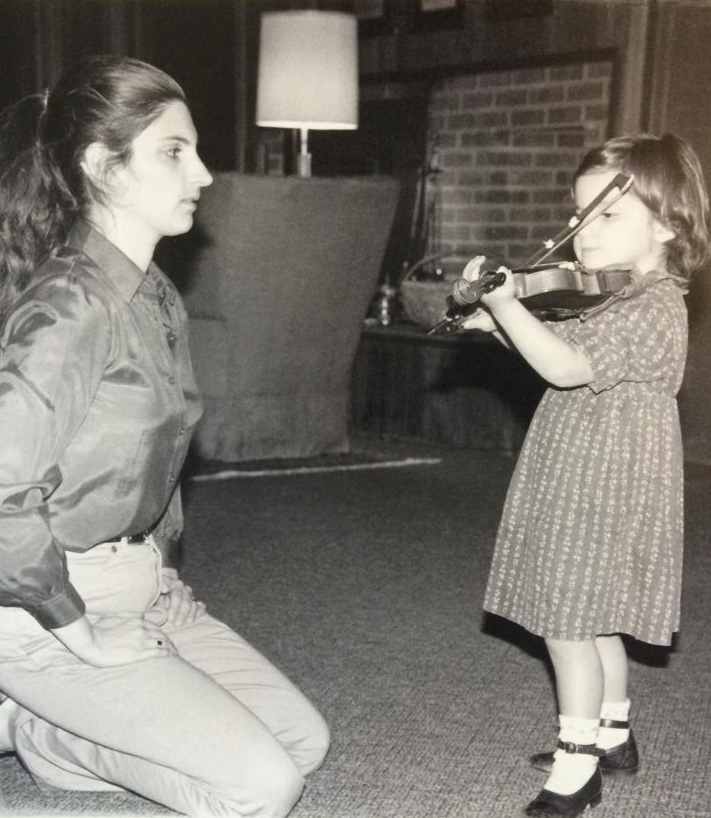Knowing What You Want (my secret weapon) and Keeping It All in Balance
Years ago I interviewed Emmanuel Hurwitz who had been first violin of the Aeolian Quartet and was also a well-known teacher. He told me something I found shocking at the time. Once, when he was playing as a soloist with an orchestra in England, the concertmaster remarked to him in reference to his musical interpretation: “You’re lucky, Manny – you know what you want.” Hurwitz told me that he remembered thinking, surprised: “Doesn’t everybody?” He then had the horrible realization that many people, musicians included, do NOT know what they want when playing or otherwise.
This is a problem that I often face in my teaching. Parents frequently do not know what they want and transmit this to their children. The result is that a child may flit from activity to activity without giving importance to any. They may only know what they DON’T want: hard work (practicing by the student) or unpleasantness (insisting on discipline by the parents). This is why many coaches can convince parents to allow their children to spend so much of their valuable extracurricular time on their sport instead of practicing the violin, for example. First of all, the teamwork and camaraderie help, but essentially the student wants to participate in the sport and the parents don’t have to make the child practice (the coach takes care of that) – it’s easy.
There is one other thing: the coaches’ conviction that participation in a sport is of overwhelming importance. This is very seductive to uncertain parents who don’t have any firm ideas or convictions and really WANT to be told what is important for their children.
So what makes the difference for music teachers? Our attitude. Knowing what we want and being totally convinced that music is an essential part of any human being’s education. I have discovered that what makes the biggest difference in getting cooperation from parents is not the numerous studies I indicate to them which show how beneficial a music education is to a student’s development and his future, but how strongly I believe in what I am doing. On numerous occasions I have overheard parents say to each other that they were making their children practice not because they were so committed to the idea of them learning to play a musical instrument, but that I WAS SO SURE that it is a good thing and they figured that if I felt that strongly about it then I must be right. Goes to show you how dangerous teachers (or proselytizers or evangelists or politicians) can be. If you truly believe in what you’re doing, then you can be dangerous, too.
Unfortunately, there are lots of teachers who are not able to develop a studio or keep their students for any period of time. Why? Some are incompetent and children quit from discouragement. Others, in my opinion, just don’t care enough. Teachers can’t afford to think that everyone knows what they know and appreciates what they do. People don’t. You have to pitch it and sell it. But first of all, you have to believe in it, just as any good salesman. So the best advice I can give any beginning teacher is to develop conviction and enthusiasm. Of course I don’t have to tell this to someone who always wanted to be a teacher. However, the music profession is full of people who must teach in order to survive because it’s extremely difficult to make a living playing and many don’t really want to. So they fall back on teaching. THOSE people have to be careful when starting out that THEY KNOW WHAT THEY WANT from themselves and their students and are prepared to fight to get it.
On the other hand, an abundance of conviction and enthusiasm, if not kept under control, can often do more harm than good, as we can see with teachers and coaches who believe the only worthwhile activity in the world is their own. So for me the most important thing to keep in mind is that I can’t help others achieve balance unless I have it in my own life. If I go nuts when I see talent and go all out to make sure it is developed without taking into consideration myriad other factors in a student’s life, then I am out of equilibrium and of no use to my student. If I consider a success only to be when a student becomes a professional or gets into a good conservatory, then I am not in balance. If I think that music training is the most important subject a child will have in his life and have disdain for other activities, hobbies and pursuits, then I am really off-base. If I take it personally when a student decides to quit or not practice as much as I think necessary for good progress, then I am too involved and thus out of balance.
In other words, to help my students I cannot allow myself to be like the many teachers and coaches who are so completely taken with their own spheres of interest that they insist that others have the same priority (or else) . But I can, in all good conscience and with great conviction, try to make sure that my students and their parents understand the importance of music training and find time (no matter how little) for it.
Share this:
Buy it on www.sharmusic.com - eBook format, avaliable worldwide, paperback in North America
COPYRIGHT
ABOUT
A music teacher’s thoughts and observations on the teaching and the study of a musical instrument, hoping to be of help to parents, students and teachers.
PHOTO
AWARDED TOP 25 VIOLIN BLOG
CATEGORIES
TAGS
ARCHIVES
-
Agosto 2022
Agosto 2023
Agosto 2024
April 2015
April 2016
April 2017
April 2019
April 2020
Aprile 2022
Aprile 2023
Aprile 2024
August 2014
August 2015
August 2016
August 2017
August 2018
August 2019
August 2021
December 2014
December 2015
December 2016
December 2017
December 2018
December 2019
December 2020
Dicembre 2022
Dicembre 2023
Dicembre 2024
Febbraio 2022
Febbraio 2023
Febbraio 2024
February 2015
February 2016
February 2018
February 2019
February 2020
February 2021
Gennaio 2022
Gennaio 2023
Gennaio 2024
Giugno 2022
Giugno 2022
Giugno 2023
Giugno 2024
January 2015
January 2016
January 2017
January 2018
January 2019
January 2020
July 2015
July 2017
July 2019
June 2016
June 2017
June 2018
June 2019
June 2020
June 2021
Luglio 2022
Luglio 2023
Luglio 2024
Maggio 2022
Maggio 2023
Maggio 2024
March 2015
March 2016
March 2017
March 2018
March 2019
March 2020
March 2021
Marzo 2022
Marzo 2023
Marzo 2024
May 2015
May 2016
May 2018
May 2019
May 2020
November 2014
November 2015
November 2016
November 2017
November 2018
November 2019
November 2021
Novembre 2022
Novembre 2023
Novembre 2024
October 2014
October 2015
October 2017
October 2018
October 2019
October 2020
October 2021
Ottobre 2022
Ottobre 2023
Ottobre 2024
September 2014
September 2015
September 2016
September 2018
September 2019
September 2020
September 2021
Settembre 2022
Settembre 2023
Settembre 2024
RECENT POSTS
Terry G and Me, or Terry Gilliam on Where (or What) Practicing the Piano Will Get You…
The Teaching We Don’t Do Is More Important Than We Think
Overwhelmingness or What Teaching and Motherhood* Have in Common
Cellphone Serenity
How to Build Your Reputation – the Kind You Want
Desperate Times, Desperate Measures. Or How to Deal With Your Strong-Willed Stubborn Student and Survive
“Why Does My Teacher Get So Frustrated?” Letter to a Perplexed Student
Mount Rush-no-more….And How to Get There
Realizzato con VelociBuilder - Another Project By: Marketing:Start! - Privacy Policy




